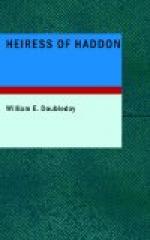AYTOUN.
Deep down in the rock upon which Nottingham Castle proudly stands, there winds a passage which was used in the centuries long gone by as the readiest way of bringing the victuals in the castle, and which has long been commonly accepted as the veritable “Mortimer’s Hole.”
A man was busily engaged in arduous toil in one of the cavities hollowed out in the very heart of the rock. It was the chamber in which the dissolute Mortimer and the faithless Isabella had been captured by the youthful monarch, Edward III., two centuries and a half earlier, but no traces of its former grandeur—if it ever possessed any—now remained. It was changed into the abode of an alchemyst, and as Edmund Wynne ever and anon tapped an iron vessel his eyes sparkled with delight.
The room was full of fumes and smoke. Phials of many shapes and various sizes were ranged around on every side, filled with liquids of every imaginable odour and hue. A long rude bench, which ran along the farther side of the room, was crowded with boxes of crystals, crucibles, and bottles, and, to complete the scene, a log fire was smouldering away on the centre of the solid rock floor.
Edmund had long sought the elixir of life, but it had proved as delusive as a will-o’-the-wisp to him, and ever, just as he felt assured of success, the prize had slipped away from his grasp, leaving him further away from success than he had been before. But now it was not the elixir that he was seeking to find. From trying to discover something that should rob the grave of its prey, he had turned his attention towards the invention of an engine to hasten death. His heart was all aflame with the passion of revenge. The lord of Haddon had incurred his intense and undying hatred. He had heaped indignities upon him; he had slain the object of his affections; and the disgrace into which he had fallen at London was also ascribed, rightly or wrongly, to the baron.
Baulked of his revenge hitherto, his passionate desire for it had decreased rather than declined through his failures, and the very fact of his failing was itself another charge for which the baron would have to answer. Death, and death alone, would now be sufficient to wipe out the stain, and Edmund had long cudgelled his wits to secure the destruction of his foe.
“Aye, Edmund, Edmund,” exclaimed Sir Ronald Bury, as he broke in upon Wynne’s privacy, “at thy whimsical labours again, I see.”
“Nay, not whimsical, Ronald,” was the gentle reply. “My elixir is nearly right; only one ingredient more is wanted, and then!”
“And then, what?” laughed the knight.
“Why, then I shall have discovered what all the sages of the earth have sought in vain.”
“A toadstone, I suppose?” replied Sir Ronald, lightly.
“Ha, you may laugh, Ronald,” said the astrologer, severely. “Fools ever did mock the wise, like the rich despise the poor. You are but a soldier, and I am a man of science—the great alchemyst! My name shall live; yea, mark me, Ronald, it will be known and revered in time to come, aye, even when this castle has crumbled into dust, and when the name of Roger Bacon has been long forgotten.”




